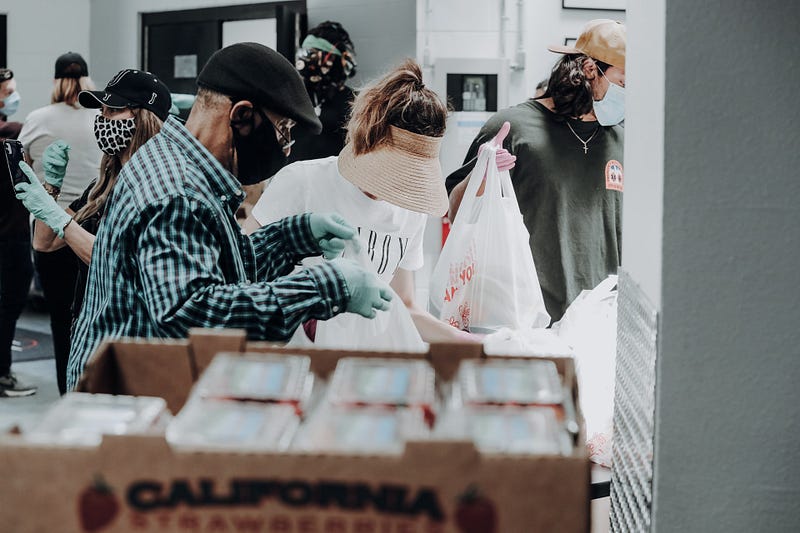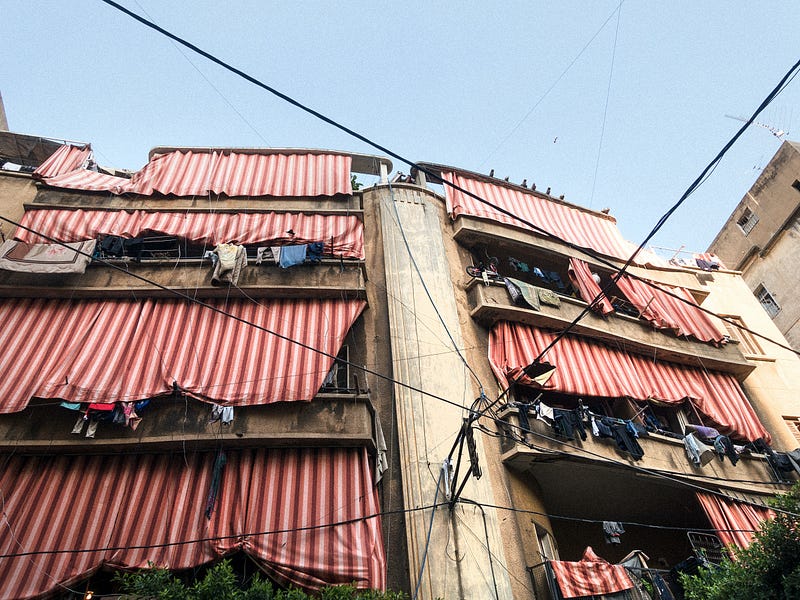A Germ’s-eye View of a Dysfunctional Society

Food banks are booming in the pandemic Photo by Joel Muniz instagram.com/infraredla
Corona virus is having a grand old time, exploiting areas where American society is divided and disorganized, problems that have been damaging us for years but went largely ignored. Now, with the pandemic shining light on these dysfunctions, we may have a chance to address them. Here are seven problem areas that prevent our controlling COVID-19 while creating suffering for millions every day.
1. A disorganized government split into federal, state, and local levels, all divided by partisanship, corrupted by lobbyists, not valuing competence. While some Asian countries brought the pandemic under control in a couple of months, as reported by John Power in the South China Morning Post, the U.S. in ten months hasn’t been able to organize testing, contact tracing, food delivery, or hospital preparedness.
A president who didn’t take the pandemic seriously did not help. Nor did each state and county’s having its own COVID policy, or Republicans and Democrats’ refusal to cooperate over details of relief bills or containment strategies. But there seems to be a deeper incompetence. Rather than manage a complex response with many moving parts; it was easier for government to just keep shutting down, reopening, and shutting down again as numbers changed.
We can manage a blunt-instrument policy like that, but a coordinated response seems too hard for us. Isn’t this the same dynamic we have seen with homelessness, gun violence, or climate change? If a problem is complicated and difficult, we don’t even try.
2. Refusal to pay people not to work. Government-ordered economic shutdowns are of questionable value in any case, but they are completely unworkable if people aren’t paid to stay home. How will their families survive? After four months of boosted unemployment pay, the US stopped paying people for not working. So, workers had to go back out and restart the epidemic.
This policy continues a long tradition of resistance to ideas of helping working people. Social Security, Medicare, and welfare have all faced violent opposition from political, professional and religious groups, as a universal basic income (UBI) does now. Working people aren’t supposed to get something for nothing; it makes us lazy. Rich people are another matter. They can apparently sit and collect interest all day without being morally harmed.
3. A for-profit health system. Focused on high-tech treatments, our $4 trillion system cannot provide the unprofitable basic care COVID-19 requires. There aren’t enough hospital beds or staff. According to Kaiser Health News, underfunded public health departments lack trained workers and resources they would need to control a pandemic.
The system of providing health insurance through workers’ jobs took away 12 million newly-unemployed people’s health insurance in the COVID Depression, according to CNBC. But even for the insured, health care in America has long been more expensive than in any other country, and ranks lowest in quality among the rich countries, according to this study by the Commonwealth Fund.
4. Justified mistrust in government and media. We’ve been lied to for so long about so many things, why would we believe what we’re told about the pandemic? Especially when the story about how it’s spread keeps changing. (Can you still get it from paper bags?) People may remember Iraq’s WMD, Russiagate, and many other hoaxes, including fake epidemics like the bird flu of 2003.
Since media and government so often try to make us afraid of illusions, we may dismiss threats that are real. Some people remember the color-coded “terror alert levels,” in 2002, based on no evidence at all, and so distrust the color-coded pandemic threats we’re seeing now. Given this history and present reality, it’s hard to get skeptical Americans on the same page with government or each other about COVID-19.
5. Race and class divisions. According to the Mayo Clinic, COVID-19 is mostly a disease of people who live and work in crowded, unhealthy conditions: working-class people, usually people of color. Professional, managerial, and wealthy people can ignore their plight, because those with enough money and space rarely get sick. So, there isn’t much political pressure to improve people’s working and living conditions. It is easier to wait for a vaccine.

6. Valuing individual freedom over collective well-being. People don’t want to wear masks and may not believe they help. They may not want to submit to testing or contact tracing. I can understand all of that, but people could also put aside their personal desires and work together for the common good. Americans don’t do that very often unless there’s a war with a designated foreign enemy, .
This dynamic comes up repeatedly. There was a time when many Americans asserted their right to drive drunk. Corporations and rich people still do all they can to avoid paying taxes.
7. Culture of cruelty. For years, Americans have been walking by homeless people and pretending we don’t see them, watching US military interventions kill people, our intelligence agencies torture them, our prison systems needlessly incarcerate them, and not saying anything about it. So, when people are losing their homes and their jobs, or their lives to COVID-19, it’s easy to keep ignoring them.
I don’t think the US is unique in this way, but friends from other countries often tell me it’s worse here.
Fixing those broken places
For years, these seven dysfunctions and others like them have usually been kept hidden. Now that we can see them, we could, at least in theory, have a chance to fix them.
I would group these problems into two categories: the rich and powerful don’t care about us, and we don’t care about each other. If we had what Rabbi Michael Lerner calls a caring society, we could fix all of them. Does anyone think we really need the poverty and separation, the division and disorganization that are enabling COVID?
If people decided they’d be better off in a caring society, rather than accepting existing dysfunctions and cruelties, COVID-19 could be an opportunity to create a better life for everyone. Of course, some people will not want to change. They will prioritize defending their privilege and their power. I’m not saying it will be easy. But neither is overcoming a pandemic, and many countries have done that. Perhaps we can too.
I’ll be looking deeper into these issues in coming weeks. Thanks for reading. Follow me on Twitter, on Facebook or on Medium.com. Hire me for freelancing, editing, or tutoring on Linked In
